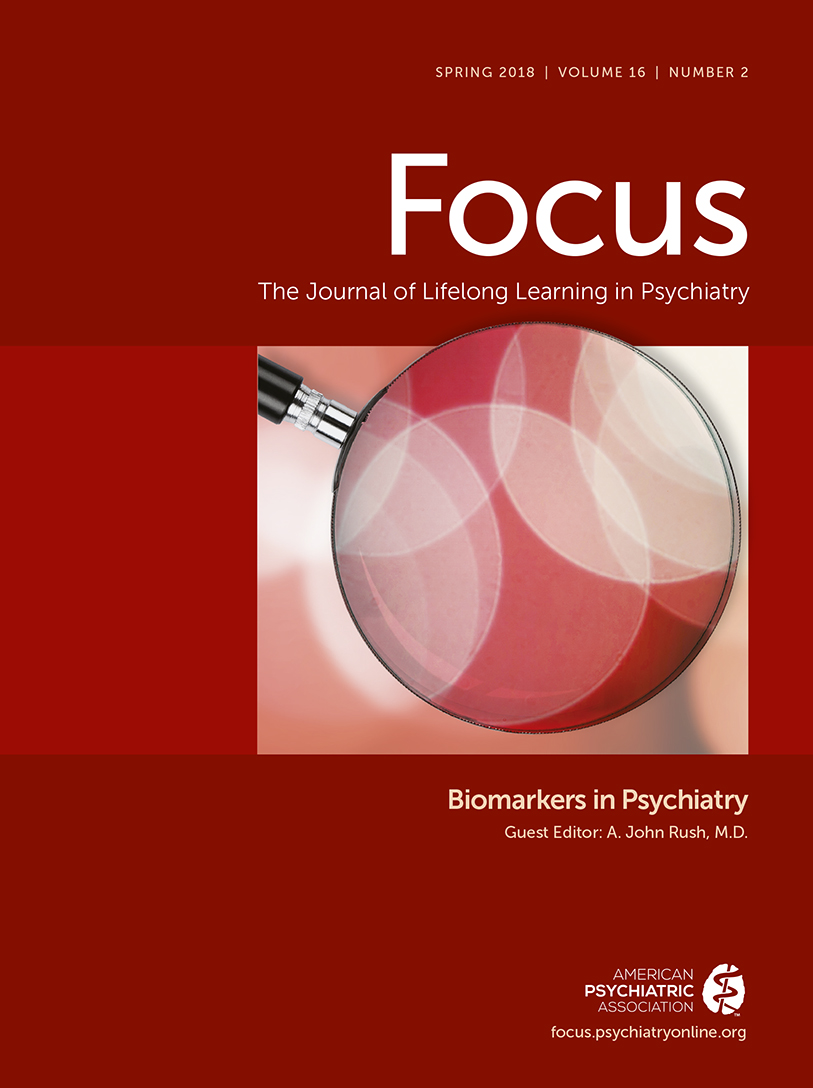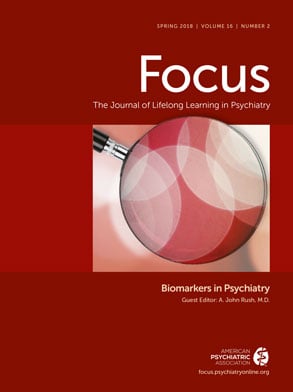Bipolar disorder can be challenging to treat, especially depressive episodes and ultrarapid cycling presentations. Patients with bipolar disorder take an average of four psychotropic medications daily (
1) and spend approximately 50% of the time symptomatic (
2,
3). The longer patients remain ill, the more social and occupational impairments accumulate, creating a sense of urgency to stabilize the illness. Given these circumstances, it is understandable that patients, their families, or their psychiatrists would want to use pharmacogenomic testing to inform their treatment plan.
Pharmacogenomic testing in psychiatry identifies various pharmacodynamic and pharmacokinetic genetic markers that take the form of copy number variants, deletions, or single nucleotide polymorphisms (SNPs). These are located within a patient’s DNA and are used to predict an individual’s likely response to and tolerability of various psychotropic medications. Rather than rely on a process of “trial and error” to select a medication, the psychiatrist can use the results from the pharmacogenomic test to make a genetically informed recommendation to the patient. There are many companies that provide pharmacogenomic testing for psychotropic medications, but coverage for their services varies by insurance company. The ability to use genetic biomarkers is exciting and brings psychiatry closer to other medical specialties wading in the waters of personalized medicine. However, before psychiatrists get their patients’ hopes up by agreeing to or suggesting the use of pharmacogenomic tests, they must first appreciate how little is known regarding the genetics of tolerability and response to bipolar disorder medications and, thus, the clinical utility of the marketed test kits.
To date, there have been no published clinical trials of pharmacogenomic guided treatment (PGT) for bipolar depression, mania, mixed states, or episodic prophylaxis among either type I or type II patients. Without such studies, it is impossible to determine the clinical validity or utility of these proprietary test kits in the treatment of any phase of bipolar disorder. On the other hand, there have been several studies that have assessed the efficacy of PGT in improving clinical outcomes in major depressive disorder. Although methodologic caveats exist, many of these studies have shown positive results (
4).
Because many of the testing kits identify pharmacodynamic and pharmacokinetic genes related to the medicines used in the treatment of bipolar disorder (i.e., mood stabilizers, second-generation antipsychotics [SGAs], and antidepressants), psychiatrists might be encouraged by the positive results seen in the major depressive disorder trials and use the kits for their bipolar patients. In support of this, one company states that its test analyzes how a patient’s genes affects his response to “drugs commonly prescribed to treat bipolar disorder,” among other psychiatric illnesses. Regardless of the illness, the pharmacokinetic genes identified may be of value in predicting tolerability and response to a particular drug to the extent that tolerability and response to that drug are influenced by cytochrome P450 and glucuronidation-based metabolism. The companies that market pharmacogenomic tests incorporate the published literature identifying genetic variants that influence the expression and function of several of these metabolic enzymes. However, a patient’s metabolic phenotype may not match his or her genotype if other agents that inhibit or induce these metabolic enzymes are present (
5). For instance, a genotypically extensive metabolizer of cytochrome 2D6 substrates can phenotypically become a poor metabolizer while the patient is taking paroxetine, a strong inhibitor of the cytochrome 2D6 enzyme. To address this limitation, some of the PGT companies have developed drug-drug-gene interaction assessments that attempt to account for these complex interactions, though their accuracy remains unknown.
Tolerability and response also may be determined by pharmacodynamic genes. Unfortunately, very few pharmacogenomic studies of drug tolerability have been conducted with bipolar patients. For antiepileptic medications, such as carbamazepine, many of the pharmacogenomic studies do not indicate the diagnosis of the case and control subjects, and they may include patients with bipolar disorder or epilepsy. Several of these studies have reported an association between the risk of Steven Johnson syndrome and the HLA-B*15:02 marker among various ethnic groups in certain Asian countries (
6). This marker is rare in non-Asian populations, but another HLA marker, HLA-A*31:01, has recently been linked to the rash among Northern Europeans (
7). For the most part, these studies included very small samples. There are no published studies examining the genetic variants that increase the likelihood of this rash among those taking lamotrigine. One recently published small study conducted in Sardinia identified a gene that may predispose a patient to develop lithium-induced reductions in glomerular filtration rate (
8). Two studies by the same group in Taiwan identified a SNP that may predict metabolic disturbances of patients with bipolar I or II taking valproate for 12 weeks (
9,
10), while another study of patients enrolled in the Systematic Treatment Enhancement Program for Bipolar Disorder identified no statistically significant genes linking SGAs to weight gain after taking the medicine for two months (
11). Two meta-analyses of the risk between polymorphisms in the promoter region of the serotonin transporter gene (5HTTLPR) and the development of antidepressant-induced mania reported contradictory results (
12,
13). With so few and inconsistent findings, using pharmacogenomic tests to predict tolerability could create a false sense of security.
Similar to the tolerability studies, the studies examining associations between genetic variants and drug response are limited. For example, results from the few genomewide association studies (GWAS) of lithium prophylaxis in bipolar disorder have not found consistent results and did not identify genes that had been associated with lithium response in small, candidate gene studies (
14). Only one candidate gene study each for valproate prophylaxis (
15) and lamotrigine depression response (
16) have been published, both of which found positive associations but have yet to be replicated in larger samples. No pharmacogenetic studies exclusively exploring carbamazepine response of patients with bipolar disorder have been conducted. Regarding antipsychotics, only two studies have been conducted in bipolar samples, one investigating an antimanic response to olanzapine monotherapy (
17) and the other an antidepressant response to the olanzapine-fluoxetine combination (
16). With regard to antidepressants, besides the olanzapine-fluoxetine study, there have been no other pharmacogenetic studies exclusively enrolling patients with bipolar disorder.
Treating bipolar disorder is complicated. Within the current body of pharmacogenomics research, there are no published studies that have reported genetic variants that can predict safe and efficacious polypharmacy or antirapid cycling strategies. Besides the limited number of bipolar disorder pharmacogenomic studies, the number of studies focusing on response in each phase (prophylaxis, depression, mania, mixed) is also quite limited. Lithium prophylaxis response is often defined in these studies retrospectively, with attempts to adjust for possible nonadherence and polypharmacy. This strategy may be affected by recall bias and may lead to the misclassification of a patient’s lithium response, affecting the validity of genetic studies. More GWAS studies evaluating response and tolerability to the various bipolar medicines are needed before including those medicines in proprietary pharmacogenomic testing kits. Psychiatrists should await the results of large, double-blind, randomized controlled PGT trials with patients with bipolar disorder before incorporating pharmacogenomic decision support tools into their treatment.

